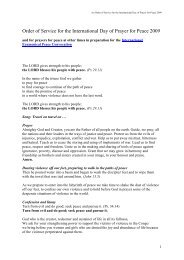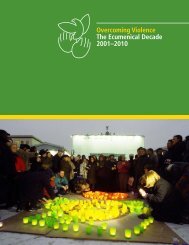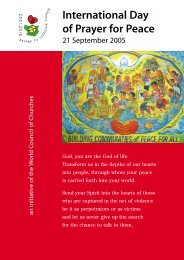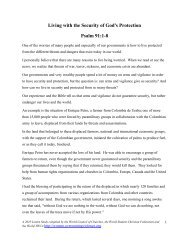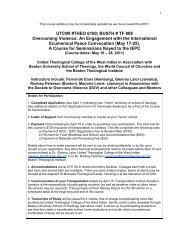Alternative Globalization Addressing Peoples and Earth
Alternative Globalization Addressing Peoples and Earth
Alternative Globalization Addressing Peoples and Earth
You also want an ePaper? Increase the reach of your titles
YUMPU automatically turns print PDFs into web optimized ePapers that Google loves.
the l<strong>and</strong>. Justice calls for deep transformation of relationships within society<br />
<strong>and</strong> with the earth.<br />
In this underst<strong>and</strong>ing, justice - itself a gift of God’s grace - is “transformative<br />
justice”, a term coined in the context of the WCC’s work on overcoming<br />
racism. Transformative justice emphasizes the constructive task of building<br />
just, participatory <strong>and</strong> sustainable communities wherever human beings<br />
have to bear the consequences of inequality <strong>and</strong> exclusion in the economic<br />
<strong>and</strong> political system. Injustice is the systematic exclusion of people from<br />
the decisions affecting their communities. It is the destruction of their<br />
capacities to be self-providing, self-organizing, <strong>and</strong> self-governing in<br />
meeting their own needs <strong>and</strong> that of the l<strong>and</strong>. Justice is present only when<br />
there is equitable distribution of social goods, as reflected in the Jubilee<br />
legislation. It also honours the Jubilee affirmation that the earth has its<br />
own requirements for its own regeneration. But the heart of transformative<br />
justice, as a matter of human agency, includes recognition <strong>and</strong><br />
participation. This means communities <strong>and</strong> societies that:<br />
• are genuinely inclusive <strong>and</strong> participatory (political, social <strong>and</strong> cultural<br />
justice);<br />
• are ready to correct mal-distribution of power <strong>and</strong> to overcome the<br />
gap between the rich <strong>and</strong> powerful <strong>and</strong> the people in poverty within<br />
<strong>and</strong> between countries (economic justice);<br />
• accept humanity’s dependence upon the earth, <strong>and</strong> support sustainable<br />
ways for organizing <strong>and</strong> developing themselves <strong>and</strong> the sharing of<br />
natural resources (ecological justice).<br />
The focus of this form of justice, then, is a clear preference for participation,<br />
mutual recognition <strong>and</strong> the agency of every member of a community, <strong>and</strong><br />
the critique of all forms of power-concentration in the h<strong>and</strong>s of only a<br />
few. The fruit of transformative justice is human dignity <strong>and</strong> peace.<br />
2.5 Sharing life at God’s table: an example of an AGAPE<br />
economy of life<br />
A glimpse of transformative justice can be seen in Jesus’ meal with sinners<br />
which the early church came to practise as the eucharist. The early church<br />
celebrated the eucharist embedded in the agape-meal in anticipation of<br />
the eschatological banquet, the final celebration of life in its fullness. In<br />
Acts 2:42ff. <strong>and</strong> 4:32-35, the early Christian community is depicted as a<br />
community sustained by a love- <strong>and</strong> life-nourishing relationship with God<br />
<strong>and</strong> with one another, a community sharing the necessities of life<br />
exchanging stories of empowerment <strong>and</strong> hope.<br />
Like the Passover meal, the agape-meal is a transformative meal. It recalls<br />
the “dangerous memory” of a liberating God, <strong>and</strong> calls for a different form<br />
15




